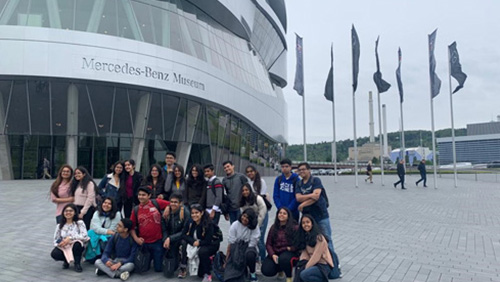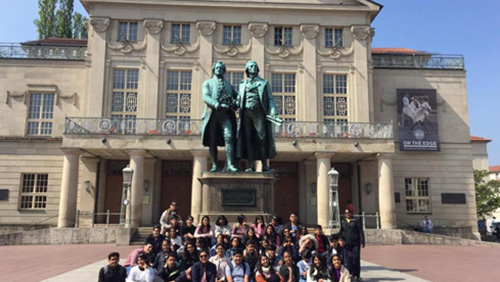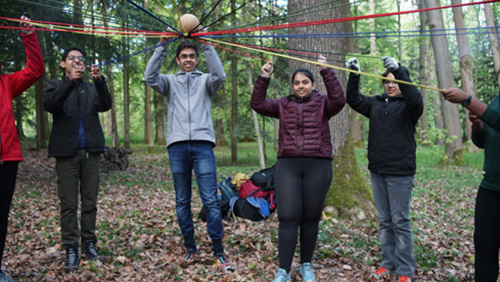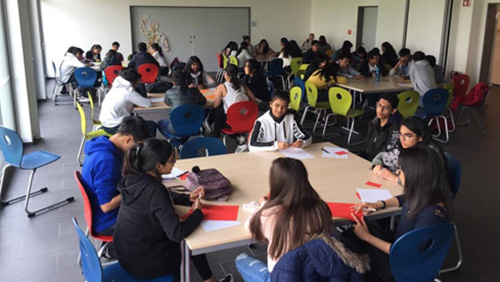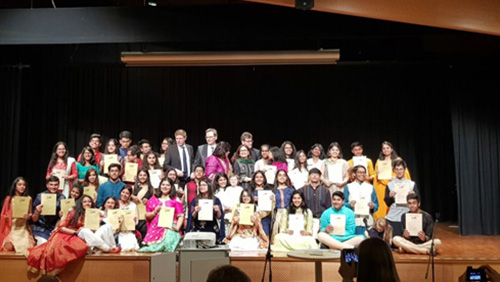
Global Links
- Danish Immersive Exchange Programme
- Estocolmo +50 - International drawing exhibition
- Anthology of Poems
- Swiss Indian Classroom Program
- Italy Dance Festival
- Indo Spanish Online Exchange Programme
- Geneva MUN Conference 2018
- DWF Environment Base Camp, Denmark
- NASA Space School Programme
- Indo German Exchange Programme
- Indo French Exchange Programme
- Indo-Polish Exchange Programme
- Model United Nations (MUN)
- International Art Festival
- US West Coast Educational Programme
- Summer Course At The Arts University Bournemouth
- UNESCO International Festival
- Pedagogical Exchange Scholarship To Germany
- Environment Base Camp 2018-19 Helsinki, Finland
- Exchange In News
- Poland Exchange
- French Concert at Alliance Française
- DELF Junior Examination July 2022
- Reconnection With Your Culture (RWYC)
- International Scholarship Programme
- Archive
Quick Links
Indo German
Exchange Programme 2018-19
“Tolerance, inter-cultural dialogue and respect for diversity are more essential than ever in a world where peoples are becoming more and more closely interconnected.”
—Kofi Annan
The second leg of XIII rhythm of Indo German Exchange Programme with Gymnasium bei St. Michael, Lise-Meitner-Gymnasium and Erasmus-Widmann-Gymnasiumcommenced from 20thApril-18th May, 2019. A group of 21 students and two teachers embarked on a memorable journey of understanding cultural diversity and learning to co-exist with compassion with different global community.
The first week was filled with festive fervour as the students became an integral part of Easter celebrations with their host families. They participated in the activities like baking cookies and finding easter bunnies along with visting friends and sightseeing. These activities helped Indian students to understand the customs and values of the host families.
On the first day of the school, the group was welcomed by all the three Principals of the partner schools. For the first time a trip to Weimar was planned where the students visited Buchenwald, a concentration camp set up during the Nazi era. Prior to their visit, the students attended a workshop wherein they were sensitised about the period of holocaust through discussions, power point presentation and movie screening. While exploring the concentration camp, the students were introduced to the dark period of history when humanity had once lost its essence. Such experiences are important for young adults as it teaches them to learn from the mistakes of past and work towards global peace and harmony. Participating in the May Day celebration with live music and bonfire added fun to the excursion.
Next two weeks were filled with day trips to interesting places and attending regular schools to understand German pedagogy. The trip to Mercedes Benz Museum in Stuttgart gave an indepth knowledge of the evolution of automobiles whereas while visiting the Audi Neckarsulm factory, they witnessed the process of making morden cars, completely without human aid. During their visit to Kunsthalle Würth, a modern art gallery in Schwäbisch Hall the students explored paintings, graphic art, and sculptures dating from 19th century onwards. An on the spot painting activity added fun and learning to the whole visit.
The most interesting activity was the Radio Show, hosted by the Indian students, which was telecasted live for the local people. The group, on the show, shared how the exchange programmes had given them new experiences and helped them in expanding their horizons.
Mr. Hermann-Josef Pelgrim, the Mayor of Schwäbisch Hall, during his interaction with the Indian students, stated that Schwäbisch Hall was, a family-friendly city with medieval flair where art and culture were given equal importance as education and where tradition and innovation merged in an excellent manner. He was impressed with the profoundness of the questions asked by the students pertaining to global issues.
Forest day, was an unforgetable experience. Walking admist the shades of green and breathing fresh air, rich with the scent of grass and flowers, unfolded the beauty and bounty of nature , an experience to be cherised forever.
Apart from the group exercusions and visits, the host families took the Indian children to many places of tourist interest like Munich, Ulm, Eisenberg, Leipzig, Stalagmites and Stalactites caves, Utting, to name a few.
The Indo German Exchange Programme helps students to foster global friendship, breeds cross culture harmony and bridges differences with international communication. In the process it also teaches young adults to accept diversity with respect, thereby making them citizens of the world community.

